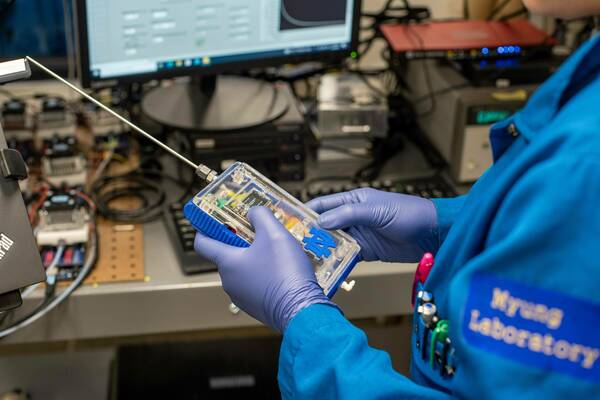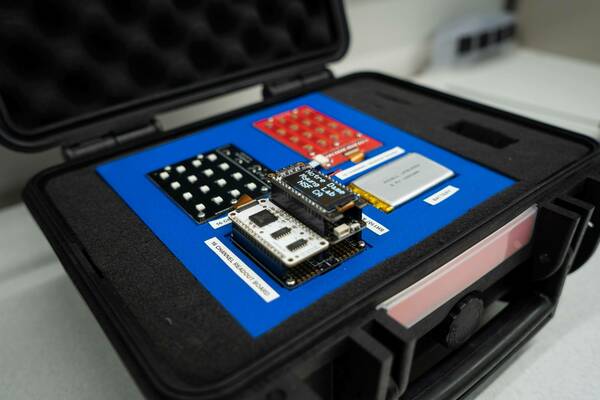Researchers to develop electronic nose for rapid disease detection

The U.S. National Science Foundation (NSF) Convergence Accelerator Program has awarded $650,000 to the University of Notre Dame to support the development of an advanced electronic nose that researchers say could help prevent the next pandemic.
“Human health is linked with animal health, and we saw during the COVID-19 pandemic what can happen when a disease passes from animals to humans and continues to spread uncontained,” explained Nosang V. Myung, the Bernard Keating-Crawford Endowed Professor in the Department of Chemical and Biomolecular Engineering.
Myung, who also directs the micro- and nanoscale biomedical instrumentation theme at the Berthiaume Institute for Precision Health, will lead the development of the new technology. His team is one of 16 teams awarded under Track L: Real-World Chemical Sensing Applications.
Myung said the electronic nose will build on existing technologies developed in his lab at Notre Dame. It will complement conventional disease prevention and management approaches by adding real-time disease monitoring.

To build the device, Myung and his team of collaborators will develop new, high-sensitivity materials using nano-engineering processes. Still, Myung says the device will be portable and affordable, so it can be used on-site by farmers, packing plant inspectors, animal husbandry technicians and others.
“The idea is to use data to make critical decisions quickly — to isolate or treat infected animals, for example — to minimize the spread of diseases,” Myung explained.
During the project’s first phase, Myung and his collaborators will equip the electronic nose to detect avian flu, which resulted in more than 40 million animal deaths and over $2.5 billion in economic losses during a 2022 outbreak. The researchers will gather data from infected birds and healthy birds and will employ machine-learning techniques to train the electronic nose to distinguish between the two.
At the same time, Emily Stoler, assistant director of risk assessment at Notre Dame’s IDEA Center, will work with Myung and his team to evaluate and pursue potential commercial opportunities associated with the electronic nose technology.
During the project’s second phase, the researchers will train the electronic nose to detect an array of other infections, both in animals and in humans. The end result will be a flexible monitoring system that can be taken to sites where infections are most likely to occur or spread.
Finally, the researchers will develop a user-friendly graphic interface that allows users to operate the device wirelessly using a smartphone and see results in real-time.

Although it has been two decades since a landmark experiment found that dogs were effective at using smell to detect human bladder cancer, the use of smell for disease diagnosis remains rare. Myung said the new device has the potential to show that smell is a valuable surveillance technique that can be affordable, accessible and also highly sensitive. The team predicts that the electronic nose will be capable of detecting smells at a sensitivity of one part per billion.
The academic collaborators who will join Myung in developing the electronic nose technology include:
- Richard Bowen, a professor of reproductive biology and virology at Colorado State University. Bowen also directs the Animal Models Core of the Rocky Mountain Regional Center of Excellence for Biodefense and Emerging Infectious Disease.
- Yamil Colón, assistant professor in Notre Dame’s Department of Chemical and Biomolecular Engineering. Colón is an expert in computational materials discovery and design.
- Bruce Kimball, a chemical ecologist at the Monell Chemical Senses Center. Monell is an independent, nonprofit scientific institute dedicated to interdisciplinary basic research on taste and smell.
To learn more, visit myung-lab.com.
Originally published by at research.nd.edu on Feb. 16.
Latest ND NewsWire
- Notre Dame Lead Innovation Team partners with local WIC program to identify, prevent lead poisoning in childrenB.A.B.E. store “shoppers” now have something new to help their families: free lead screening kits offered by the University of Notre Dame’s Lead Innovation Team.
- Vatican honors Martin and Carmel Naughton with papal awardThe late Pope Francis, in one of his last acts, conferred the honour of the Order of Saint Gregory the Great upon Carmel and Martin Naughton, Trustee Emeritus of the University of Notre Dame. The papal honor is in recognition of the Naughtons’ outstanding philanthropy in the areas of education and the arts, particularly in the provision of philanthropic support and scholarships to Catholic education at the University of Notre Dame and Kylemore Abbey, and in their transformative contributions to higher education in Ireland.
- Brain tumor growth patterns may help inform patient care managementAssistant Professor Meenal Datta (University of Notre Dame/Wes Evard) A team of researchers from the University of Notre Dame, Harvard Medical School/Massachusetts General Hospital, and Boston University has developed a technique for measuring a brain tumor’s mechanical force and a new model to estimate how much brain tissue a patient has lost.
- Notre Dame elects two new TrusteesTwo new Trustees — John F. Crowley and Danielle Walker Merfeld — have been elected to serve on the University of Notre Dame’s Board of Trustees effective July 1. …
- From reaction to resolution: The future of allergy treatmentTwelve-year-old Lauren Eglite was thrilled to attend a Notre Dame football game with her father, Erik, in 2017, even though her acute peanut allergy demands constant vigilance. She was even more excited when the stadium’s brand-new video board aired an NBC Fighting…
- Notre Dame student uses ‘American Ninja Warrior’ spotlight to fight world hunger via his nonprofitOn July 14 (Monday), a University of Notre Dame business student will compete in the semifinal round of NBC’s “American Ninja Warrior” to advocate for an end to world hunger, an ambition he works toward by making knotted dog toys and collecting donations to his nonprofit.












